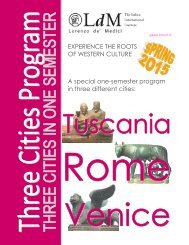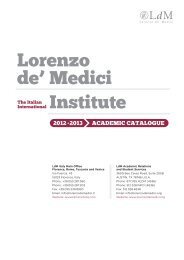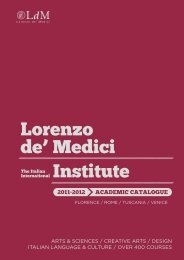aCademiC Catalog 2013-2014 - Lorenzo de Medici
aCademiC Catalog 2013-2014 - Lorenzo de Medici
aCademiC Catalog 2013-2014 - Lorenzo de Medici
You also want an ePaper? Increase the reach of your titles
YUMPU automatically turns print PDFs into web optimized ePapers that Google loves.
School of Arts & Sciences ROME<br />
Intercultural Communication<br />
COM 290 R; Dual listed: ANT 290 R<br />
Cr: 3; Contact hrs: 45<br />
The course, which introduces stu<strong>de</strong>nts to the basic patterns<br />
of cross-cultural psychology and communication, proposes<br />
an analysis of communication behavior in interpersonal and<br />
intercultural, individual and group environments. Along with a<br />
study of the influence of culture on i<strong>de</strong>ntity, viewpoints, and<br />
communication, it progressively proposes all the theoretical<br />
concepts that are necessary to analyze communication in<br />
an interpersonal and intercultural context. Topics inclu<strong>de</strong>:<br />
common communication difficulties, communication roles<br />
and proxemics. Special emphasis is placed on rituals, message<br />
patterns, clothing, myths, i<strong>de</strong>ologies, and on the influence of<br />
the mass media on our cross-cultural representation of reality.<br />
Prerequisites: Junior standing<br />
Public Relations<br />
COM 300 R<br />
Cr: 3; Contact hrs: 45<br />
We will study the <strong>de</strong>finitions, functions and evolution of public<br />
relations, including the application of PR theory and ways to<br />
plan a PR campaign (planning process, issue analysis, research<br />
methods and strategies). The different fields in which public<br />
relations practitioners operate will be presented in relation to<br />
case studies and exercises: media relations, event management,<br />
crisis management, corporate i<strong>de</strong>ntity, internal/external<br />
communications, community relations, international PR and<br />
marketing support, and effectiveness evaluation. Finally, future<br />
perspectives and new technological opportunities will be taken<br />
into account, trying to <strong>de</strong>fine new boundaries for a discipline<br />
too often un<strong>de</strong>rrated or misun<strong>de</strong>rstood.<br />
Prerequisites: COM 180 Mass Communication, or equivalent<br />
Writing for the Media<br />
COM 312 R<br />
Cr: 3; Contact hrs: 45<br />
This course is inten<strong>de</strong>d for stu<strong>de</strong>nts who are interested in<br />
writing for the media. Writing exercises, geared towards<br />
improving the stu<strong>de</strong>nts’ command of article <strong>de</strong>velopment<br />
will be combined with field reporting and producing to help<br />
stu<strong>de</strong>nts gain practical experience in writing for print media<br />
outlets. Objectives of the course are: to provi<strong>de</strong> experience<br />
in writing various types of stories, and to <strong>de</strong>velop skills<br />
in reporting and news gathering techniques; to <strong>de</strong>velop<br />
critical acumen necessary to check stories for accuracy and<br />
correctness; to <strong>de</strong>velop skills in graphics or photography that<br />
complement the journalistic writing skills; and to provi<strong>de</strong> actual<br />
practical experience <strong>de</strong>veloping content. Special attention<br />
will be <strong>de</strong>voted to <strong>de</strong>veloping news stories focusing on Rome<br />
as Italy’s capital city and the center of Italian politics and the<br />
Italian media world.<br />
Prerequisites: WRI 150 Writing for College, or equivalent<br />
Communications Internship<br />
COM 362 R<br />
Cr: 3; Contact hrs: 135<br />
This course provi<strong>de</strong>s practical and professional experience in<br />
the field of Communications at a distinctive Italian placement<br />
site. The intern is monitored by both the onsite supervisor and<br />
an LdM faculty member. The gra<strong>de</strong> assigned by the faculty<br />
internship supervisor reflects assessment of weekly reports,<br />
two papers, and an overall evaluation. Ten hours weekly at the<br />
internship site; stu<strong>de</strong>nt internship schedules and onsite duties<br />
may vary. The placement is with a private publishing company<br />
specialized in tourist information. Interns may <strong>de</strong>velop and<br />
carry out various activities which may inclu<strong>de</strong> but are not<br />
limited to: writing articles, updating articles, events research,<br />
filing database entries; contributing to blogs, social media,<br />
websites; <strong>de</strong>veloping new projects.<br />
Note: Placement opportunities are limited and subject<br />
to change. Stu<strong>de</strong>nts who enroll must submit supporting<br />
documentation by the registration <strong>de</strong>adline, and acceptance is<br />
conditional upon result of an onsite interview during the first<br />
week of the term. Fluency in Italian may be advantageous.<br />
Prerequisites: English/Writing/Journalism majors of junior<br />
standing<br />
Cultural Studies<br />
Women, History and Culture<br />
CLT 250 R; Dual listed: GND 250 R<br />
Cr: 3; Contact hrs: 45<br />
The course surveys the changing roles and perceptions of<br />
women in Western history and culture from ancient times to<br />
the present. The relatively recent political enfranchisement<br />
of women and the rise of feminist thought and theory offer<br />
a framework and a <strong>de</strong>stination. Stu<strong>de</strong>nts examine a wi<strong>de</strong><br />
variety of exemplary roles (wife, mother, priestess, nun, etc.)<br />
and individuals. Matrifocal societies and the wi<strong>de</strong>spread cult of<br />
the Mother God<strong>de</strong>ss were supplanted by patriarchal traditions,<br />
examined through Judaism and the Classical Greek world and<br />
their i<strong>de</strong>as, texts, mythologies, and social strategies. Stu<strong>de</strong>nts<br />
next explore the religious, social, and medical views of the first<br />
millenium and a half of the CE. With the Renaissance arrive<br />
new and better-documented perceptions by and of women.<br />
Social policies and both high and popular culture reveal<br />
persistent prejudices. The Early Mo<strong>de</strong>rn era brings changes<br />
in social position as women become agents in the arts and<br />
sciences. Women’s Rights are inscribed upon wi<strong>de</strong>r social and<br />
cultural struggles of the mo<strong>de</strong>rn world. In conclusion, stu<strong>de</strong>nts<br />
encounter constructions of women present in today’s culture<br />
and media, and still unresolved issues.<br />
Prerequisites: HIS 130 Western Civilization, or equivalent<br />
Gen<strong>de</strong>r Studies<br />
Women, History and Culture<br />
GND 250 R; Dual listed: CLT 250 R<br />
Cr: 3; Contact hrs: 45<br />
The course surveys the changing roles and perceptions of<br />
women in Western history and culture from ancient times to<br />
the present. The relatively recent political enfranchisement<br />
of women and the rise of feminist thought and theory offer<br />
a framework and a <strong>de</strong>stination. Stu<strong>de</strong>nts examine a wi<strong>de</strong><br />
variety of exemplary roles (wife, mother, priestess, nun, etc.)<br />
and individuals. Matrifocal societies and the wi<strong>de</strong>spread cult of<br />
the Mother God<strong>de</strong>ss were supplanted by patriarchal traditions,<br />
examined through Judaism and the Classical Greek world and<br />
their i<strong>de</strong>as, texts, mythologies, and social strategies. Stu<strong>de</strong>nts<br />
next explore the religious, social, and medical views of the first<br />
millenium and a half of the CE. With the Renaissance arrive<br />
new and better-documented perceptions by and of women.<br />
Social policies and both high and popular culture reveal<br />
persistent prejudices. The Early Mo<strong>de</strong>rn era brings changes<br />
in social position as women become agents in the arts and<br />
sciences. Women’s Rights are inscribed upon wi<strong>de</strong>r social and<br />
cultural struggles of the mo<strong>de</strong>rn world. In conclusion, stu<strong>de</strong>nts<br />
encounter constructions of women present in today’s culture<br />
and media, and still unresolved issues.<br />
Prerequisites: HIS 130 Western Civilization, or equivalent<br />
Geography and Environmental<br />
Studies<br />
Introduction to Environmental Issues<br />
ENV 180 R<br />
Cr: 3; Contact hrs: 45<br />
It is important in our lives to have more information to<br />
un<strong>de</strong>rstand, if possible, our mission on earth. Emphasis is placed<br />
on key concepts and generalization of global environmental<br />
issues within an earth-systems science framework including<br />
climate change, air pollution, land and coastal <strong>de</strong>gradation,<br />
water resources and pollution, and habitat loss. The course<br />
introduces stu<strong>de</strong>nts to ecological concepts that provi<strong>de</strong> a<br />
foundation for un<strong>de</strong>rstanding present and future environmental<br />
issues, and learning about critical environmental issues as<br />
population growth, natural resource management, biodiversity<br />
and global changes, wil<strong>de</strong>rness, food production, and changing<br />
habitats.<br />
136<br />
LdM Aca<strong>de</strong>mic <strong>Catalog</strong> <strong>2013</strong>-<strong>2014</strong>





